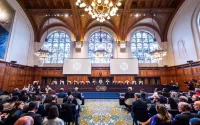By Cynthia L. Webbwashingtonpost.com Staff WriterTuesday, December 17, 2002; 10:35 AM
WiFi, a technology that provides wireless Local Area Network Internet access for cord-free, high-speed Internet surfing, is heralded as one of the few glimmers of hope for the otherwise lackluster tech sector. Companies like Microsoft, AT&T and IBM are jumping on the WiFi bandwagon to make sure to get their technology and name attached to the growing sector.
But before you put your retirement nest egg in any WiFi mutual funds, the Defense Department is warning that wireless networking technology could interfere with military radar systems, according to an article in today's New York Times. Uncle Sam wants the private-sector WiFi players to tweak the technology so it won't jam the radio frequencies the military uses, among other changes. Industry players worry that government limits on WiFi could stymie further innovation. "Nobody, including the Pentagon, doubts that this is important for consumers and industry," Steven Price, deputy assistant secretary of defense for radio spectrum matters, told the newspaper. "The problem comes when it degrades our military capabilities." Microsoft and Intel were among the companies that met last week with the Defense Department to try and iron out any differences, according to the paper. • The New York Times: Limits Sought On Wireless Internet Access (Registration required)
Managing the nation's finite spectrum resources is a big issue. The Federal Communications Commission last week began proceedings that could boost available spectrum for high-speed wireless networks. The FCC is asking for public comment about the possibility of allowing "unlicensed transmitters to operate in additional frequency bands." InternetNews.com wrote of the FCC's move: "In the last year, the popularity of these networks has shown strong growth and, in turn, demand for spectrum space for the networks has increased," InternetNews.com wrote of the FCC's move to look at available spectrum. • InternetNews.com FCC Begins Process to Increase Wi-Fi Frequencies
WiFi got a boost earlier this month when AT&T, Intel and IBMannounced the formation of a new company, called Cometa Networks, to sell national wireless Internet access. And smaller companies, despite any potential troubles from the U.S. military, are trying to make a mint in the WiFi space too. One example: Wise Technologies of Landover, Md. got its start in 2001 by running a free connection at the Georgetown Cafe in Washington. The wireless Internet company now has 2,000 customers and focuses on small businesses and restaurants that may be "overlooked by large WiFi providers," according to a feature on the company in The Washington Post. • The Washington Post: Small Businesses Need Wireless Internet Too
Research outfit IDC last week outlined its predictions for technology developments in 2003. On the list? WiFi. IDC said the wireless local area networks are expected to take off. Wise and Cometa are likely to face crowded competition. But the snags along the way, including potential military hurdles, are certainly something to watch. • CNET's News.com: IDC: Cyberterror and Other Prophecies • IDC's Predictions 2003: What's Hot and What's Not
$20 Million And Change
It's official. Michael Capellas can start his new job as chairman, chief executive and president of WorldCom. Two federal judges yesterday approved his employment contract, even though he's been working at the bankrupt telecom since the beginning of December. Not a bad deal for Capellas -- he will get a fat $20 million over three years and future bonuses linked to carrying out new ethical standards at WorldCom. Capellas, former No. 2 at Hewlett-Packard, is expected to scrub any old board members who were around during the period that WorldCom racked up some $9 billion in bad accounting. • The Washington Post: WorldCom CEO's Pay Package Approved • The Clarion-Ledger: WorldCom Monitor To Keep Clout
Dialing Uncle Sam
The U.S. government is becoming an important revenue booster for the troubled tech industry, and telecoms are no exception. The latest winner? Nextel Communicationshas signed a contract with at least a two-year term with the General Services Administration to provide wireless services to all federal agencies and some state and local agencies with federal funding. The contract could generate an estimated $200 million a year in sales for the Reston, Va.-based company. • The Washington Post: Nextel Signs $200M-A-Year GSA Contract • Reuters: Nextel Awarded $200 Million A Year Government Contract
Problems in Cybersecurity Land
A commission headed by former Virginia Gov. James Gilmore (R) to assess the domestic response to terrorism, has released a report critical of the Bush administration's cybersecurity policy, including the president's Critical Infrastructure Protection Board. The Gilmore Commission recommended that the White House's cybersecurity and physical security policies be tied together, instead of being separate, among other changes. "National coordination of cybersecurity policy has not significantly improved," the report said in a section on critical infrastructure. • Government Computer News: Gilmore Commission Raps Cybersecurity Policy • The Washington Post: Gilmore Panel Backs New Terrorism Agency • Gilmore Commission's Fourth Annual Report (PDF) • Section of commission report focused on Cybersecurity (PDF)
Digital Government
President Bush is scheduled to sign the Electronic Government Act of 2002 today, further requiring government agencies to put their information online. Check TechNews.com later today for updates on the bill signing. • The Associated Press (via Yahoo!): Measure Puts More Gov't Services Online • Presidential Memo on the Importance of E-Government
Now How About Rescheduling That Holiday Party?
America Online has been trimming staff and even canceled its annual holiday party to save money as it struggles to improve its bottom line. Now, the AOL Time Warner online unit is slated to receive nearly $7 million in damages after a U.S. court ruled that CN Productions sent AOL's users nearly 1 billion unauthorized spam messages, including adult-themed junk mail. I bet $7 million would throw one heck of a holiday blast! • Reuters (via washingtonpost.com): AOL Awarded Almost $7 Million In Spam Case • Computerworld: AOL Wins $7 Million Award in Anti-Spam Case • CNET's News.com: AOL awarded millions in spam case
Sounding Board: New Domain Names
Christine Pommerening of the George Mason University School of Public Policy wrote in response to yesterday's Filter write-up of a decision by Internet authorities to add more top-level domain names. "I think adding restricted TLDs [that's Internet policy-speak for top-level domains] is not such a bad idea. Problems that arise from the current open address space like bad faith registrations could be prevented. By adding new space, where interested groups, and not ICANN or VeriSign, set the particular rules for allocation, it might even be possible to (re-)turn the general-access TLDs to a truly open space. ICANN would still be important to assure interoperability, but only on a very general level. Reducing ICANN's authority might also reduce its apparent democratic deficit."
Thanks for the input. If you'd like to sound-off about ICANN's TLD decision, send me an e-mail.
Filter is designed for hard-core techies, news junkies and technology professionals alike. Have suggestions, cool links or interesting tales to share? Send your tips and feedback to [email protected].
© 2002 TechNews.com http://www.washingtonpost.com/ac2/wp-dyn/A1268-2002Dec17?language=printer






